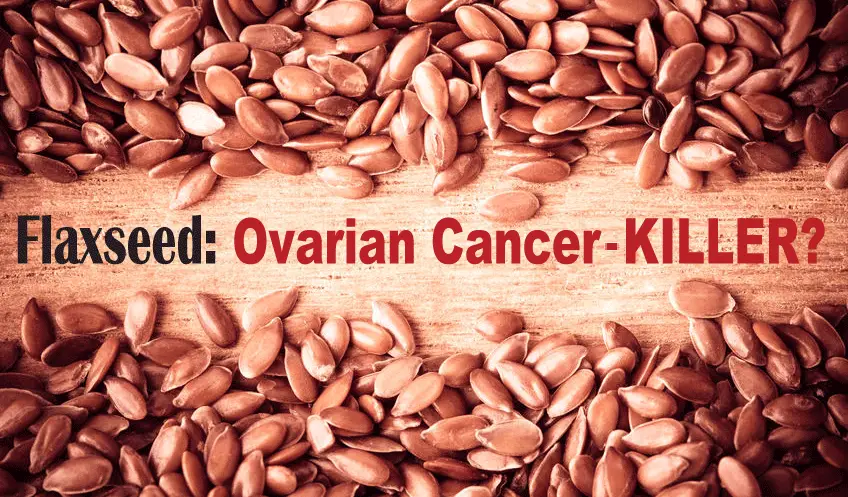By Sayer Ji
Contributing Writer for Wake Up World
Ovarian cancer has the unfortunate distinction of being the most deadly gynecological cancer known to conventional medical practice today, while also being one of the most frequently misdiagnosed conditions (i.e. ‘overdiagnosed’), with five times more women without ovarian cancer ending up having surgery than those with ovarian cancer. This is a devastating though largely unpublicized fact I discussed in greater depth in an article on GreenMedInfo.com: “Ovarian Cancer: What We Think We Know May Harm Us.”
Considering that the present day ‘standard of care’ within conventional medical practice for ovarian cancer is surgery, radiotherapy and chemotherapy – all of which have potentially deadly side effects including, ironically, cancer and/or increased cancer invasiveness – shouldn’t safe and effective alternatives be given our full attention?
So what are these alternatives?
[pro_ad_display_adzone id=”110028″]
At GreenMedInfo.com we have indexed published research on over 30 natural substances with experimentally confirmed potential as anti-ovarian cancer agents, including common plant phytocompounds such as curcumin (turmeric), genistein (soy, kudzu, red clover), and resveratrol (grapes, red wine, peanuts). But the one substance that is taking on increased relevance in the fight against women-specific cancer is flaxseed, which has already been extensively shown by research to reduce breast cancer incidence, and even shows some direct anti-tumor properties.
To catch up on this amazing research, you can review some of our previous articles on the topic:
- Flaxseed Can Prevent And Kill Breast Cancer, Meta-Analysis Reveals
- Confirmed: Flaxseed Contains ‘Estrogens’ That Regress Cancer
- Flaxseeds Reduce Breast Cancer Mortality By Up To 70%
- The Medicinal Wonder of Flaxseed
A 2010 study published in the journal Gynecological Oncology found that hens fed with a 10% flaxseed-enriched diet for 1 year had “a significant reduction in late stage ovarian tumors”, as well as “overall better health and reduced mortality”. [1] The study authors concluded “These findings may provide the basis for a clinical trial that evaluates the efficacy of flaxseed as a chemo-suppressant of ovarian cancer in women”.
More recently, a study published this year in BMC Genomics looked deeper into the possible molecular mechanisms involved in flaxseed’s anti-tumor properties in ovarian cancers. [2] Researchers used a “bioinformatic” approach by analyzing the pattern of gene expression in ovarian tumors, identifying which genes are up-regulated when tumors form and which are suppressed when the hens are fed a 10% flaxseed diet.
Interestingly, they found that “a group of highly up-regulated genes that are involved in the embryonic process of branching morphogenesis [note: embryogenesis and carcinogenesis share similarities]” were reduced 40-60% in flaxseed fed hens. Moreover these ‘cancer associated’ changes in gene expression corresponded with increases in two specific cancer-associated biomolecules — E-cadherin and miR200 — both of which were decreased 60-75% in tumors from flax-fed hens.
The study authors concluded “that nutritional intervention with flaxseed targets the pathways regulating branching morphogenesis and thereby alters the progression of ovarian cancer”.
Obviously, this is only preliminary research, and since flaxseed has not gone through validation by the randomized, placebo-controlled, human trials required to receive the FDA drug approval needed for conventional oncologists to feel comfortable recommending it for prevention or treatment of ovarian cancer, you won’t hear anyone within the conventional medical establishment recommend or prescribe it.
But should that prevent us from using it?
As a food, flaxseed is exceptionally safe and affordable. This alone is reason enough to give it priority consideration when it comes to dietary and/or functional medical interventions for serious conditions that conventional medicine admits it has no effective solutions for.
Lastly, true prevention requires the avoidance of preventable causes of ovarian cancer which include chemicals and incompatible foods. GreenMedInfo’s ovarian cancer research page lists several known risk factors for ovarian cancer, e.g. cow’s milk, bisphenol A, acrylamide.
In short, often the ‘cure’ for cancer is to identify, remove and/or remedy the damage associated with the cause.
References:
[1] Kristine Ansenberger, Cassandra Richards, Yan Zhuge, Animesh Barua, Janice M Bahr, Judith L Luborsky, Dale Buchanan Hales. Decreased severity of ovarian cancer and increased survival in hens fed a flaxseed-enriched diet for 1 year. Gynecol Oncol. 2010 Feb 12. Epub 2010 Feb 12. PMID: 20153884
[2] Karen H Hales, Sheree C Speckman, Nawneet K Kurrey, Dale B Hales. Uncovering molecular events associated with the chemosuppressive effects of flaxseed: a microarray analysis of the laying hen model of ovarian cancer. BMC Genomics. 2014 ;15(1):709. Epub 2014 Aug 24. PMID: 25150550
Further articles by Sayer Ji:
- Ice Buckets Are NOT the Cure for ALS – 60 Natural Cures the “Ice Washing” Campaign Isn’t Funding!
- How Monsanto’s ‘RoundUp’ is Cursing the Global Food Supply
- Is Miami on the Brink of a Nuclear Disaster?
- Garlic Cures 100% of Warts In Clinical Study
- 7 Simple Ways to Unclog Your Arteries Naturally
- Why Monsanto’s ‘Cure’ For World Hunger Is Cursing The Global Food Supply
- 13 Alternatives to Viagra That Won’t Fall Flat
- Research Proving Vitamin C’s Therapeutic Value in 200+ Diseases
- Sesame Seeds – Ten Amazing Health Benefits Of This Super-Seed
- Biophotons: The Human Body Emits, Communicates with, and is Made from Light
- 3 Evidence-Based Ways To Reverse Skin Aging Naturally
- How to Clean Your Arteries With One Simple Fruit
- 13 Evidence-Based Medicinal Properties of Coconut Oil
- The Spice That Prevents Fluoride From Destroying Your Brain
- Turmeric Beats Ibuprofen for Arthritis of the Knee
- Probiotics Destroy Toxic Chemicals In Our Gut For Us
- Measles Outbreak: a Failing Vaccine, Not a Failure To Vaccinate
About the author:
Sayer Ji is an author, educator, Steering Committee Member of the Global GMO Free Coalition (GGFC), advisory board member of the National Health Federation, and the founder of GreenMedInfo.com – an open access, evidence-based resource supporting natural and integrative modalities. His writings have been published and referenced widely in print and online, including Truthout, Mercola.com, The Journal of Gluten Sensitivity, New York Times and The Well Being Journal.
In 1995 Sayer received a BA degree in Philosophy from Rutgers University, where he studied under the American philosopher Dr. Bruce W. Wilshire, with a focus on the philosophy of science. In 1996, following residency at the Zen Mountain Monastery in upstate New York, he embarked on a 5 year journey of service as a counsellor-teacher and wilderness therapy specialist for various organizations that serve underprivileged and/or adjudicated populations. Since 2003, Sayer has served as a patient advocate and an educator and consultant for the natural health and wellness field.
Visit GreenMedInfo online and on Facebook, or sign up for GreenMedInfo’s Newsletter.
[pro_ad_display_adzone id=”110027″]








